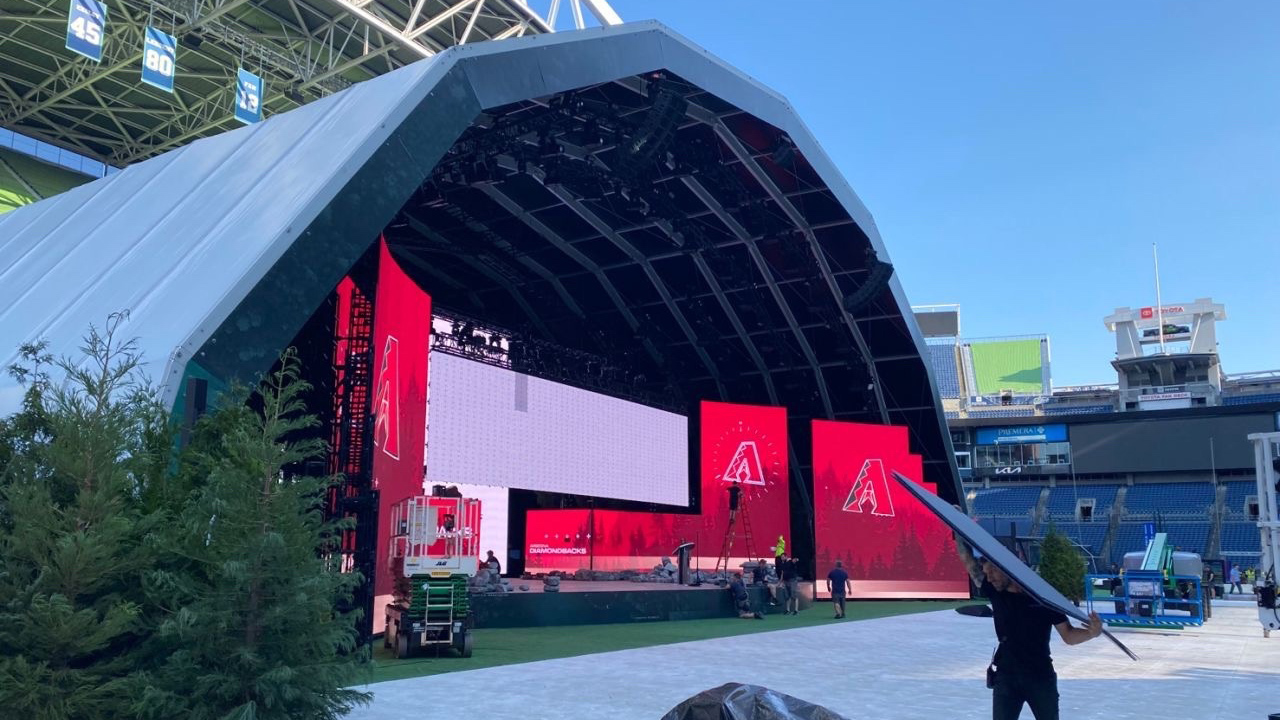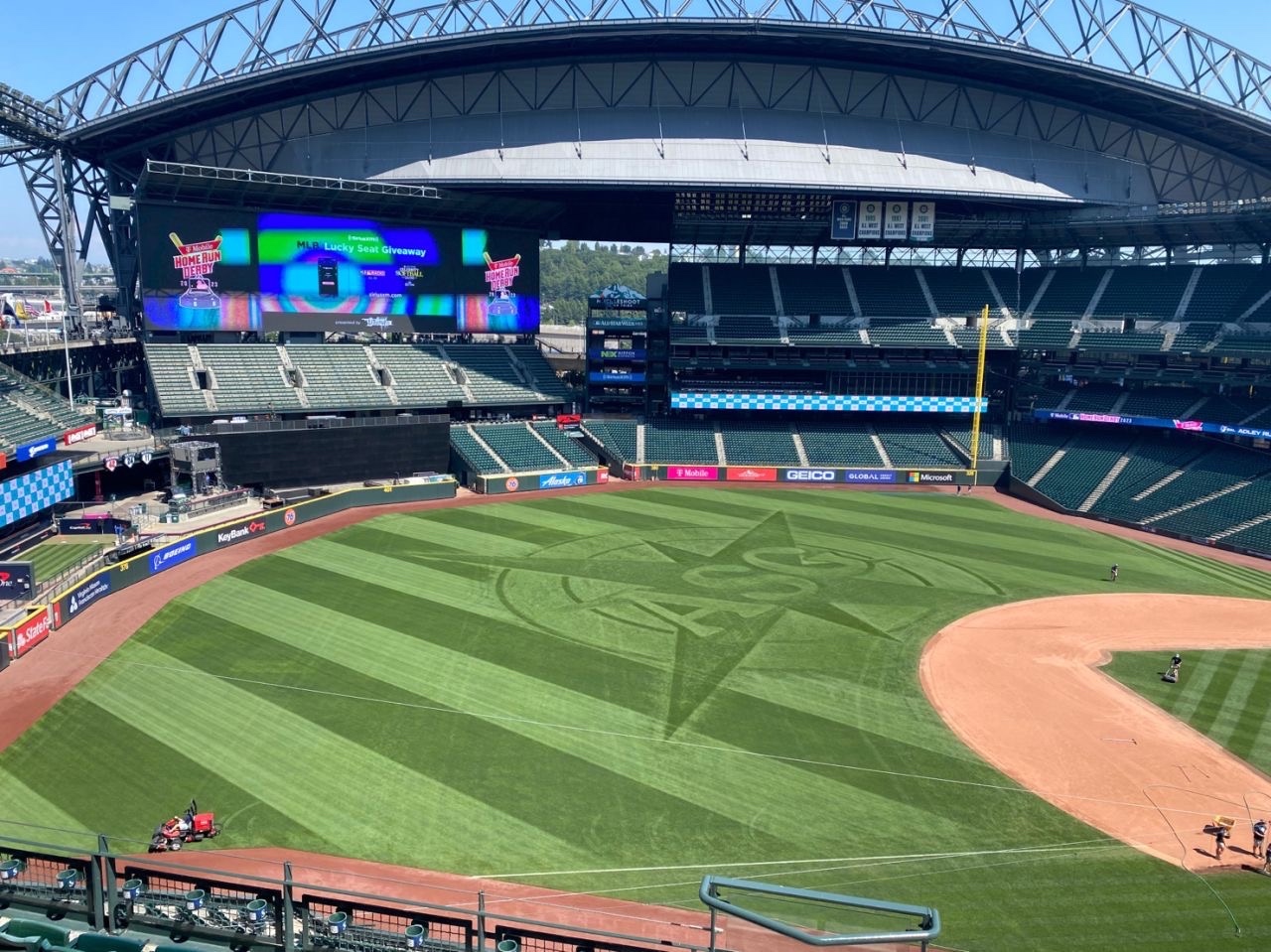
From the MLB Home Run Derby to the 2023 MLB All-Star Game, CP Communications once again brought its live sports production expertise to the MLB All-Star Game weekend of events, with 30 crew members supporting 11 shows and eight clients from several venues in Seattle across a four-day stretch from July 8-11. The CP Communications team provided RF equipment solutions and technical support services for the MLB Futures Game and Celebrity Softball Game at T-Mobile Park (both July 8), the MLB Draft at Lumen Field on July 9, and the MLB Home Run Derby event at T-Mobile Park on July 10.
CP Communications supplied turnkey video, audio, and communications solutions customized for each client, which included the MLB Commissioner’s Office, several TV and radio networks, and two specialty service providers covering in-venue audio and fireworks. CP Communications also managed all RF Coordination services, which includes identifying available spectrum inside each venue and assigning frequencies for each client and applicable RF gear to cover the events.
[Meet the Wireless AV Team from Super Bowl LVII]
CP Communications has been providing live production and RF content acquisition services for the MLB All-Star Game and related events for more than three decades. While the company brings a similar range of services and production approach each year, there are always novel challenges based on the nuances that comes with each new city, venue, and event.
“We worked even closer than usual with the stadium operations team this year for a variety of reasons,” said Aaron Segarra, vice president of sales, CP Communications. “That included more intensive coordination of intercom between the MLB, broadcasters, and in-house technicians to ensure seamless communication for events. This is especially critical because the MLB and venue teams need clear communication with each of the five broadcast clients as they air their coverage of specific events. There were also new technical challenges to address, including the development of new customized audio enclosures for microphones and transmitters on the field. Those were redesigned to adjust to the larger base sizes that appeared at the start of this season, which by default now have larger valve stems to connect the audio systems underground.”

Broadcasters serviced this year for various events include ESPN, ESPN Radio, FOX Sports, MLB Network, and SiriusXM. CP Communications also supported in-venue studio productions, including pre and post-game shows, for ESPN (Baseball Tonight), FOX, and MLB Network.
[How an MLB Spring Training Stadium Transforms into Multipurpose Event Venue]
Loren Sherman, lead frequency coordinator for CP Communications, was responsible for ensuring that each client was assigned the RF frequencies they needed to support their live productions. Besides ensuring that each entity is assigned specific frequencies to operate on for an event’s duration, Sherman and his team are careful to avoid interference with established spectrum users in the area, such as broadcast stations, as well as other temporary spectrum users that cover the events.
“Seattle is one of the rare large cities that has some available spectrum, so we were able to develop a very strategic frequency coordination plan that covered all of our clients, as well as other ENG teams that requested frequencies for their news coverage,” said Sherman. “We filled the 902-928 MHz spectrum, assigning frequencies for multiple devices including intercom and data systems, and elsewhere we assigned more than a few hundred frequencies for microphones, IFB and other intercom systems in the UHF TV spectrum. We also assigned more than 20 wireless cameras within several frequency bands above 1GHz. Separately, we problem-solved RF coordination issues for the in-venue FlyCam system, providing the operator with cleaner spectrum that solved some connectivity issues. Overall, we had a team of six frequency coordinators on staff to problem-solve for all events.”
The trust built across CP Communications and their various clients resonates to the point where they now often share certain frequencies with each other. “The MLB Network wanted to mic 20 players during one event on Saturday, and there simply weren’t enough frequencies left to assign,” said Sherman. “As some other broadcasters were not producing events at the time, we developed a plan where clients could access a database that displayed available frequencies assigned to other clients that they could temporarily borrow. That reduced a lot of headaches for everyone involved and demonstrated the trust that we have helped to build through years of strong customer service.”
[The Minnesota Twins Go Big on Massive LED Overhaul]
For CP Communications, the biggest change this year on the content acquisition and production side was a stronger emphasis on the MLB Draft. “The first day was broadcast live on ESPN and MLB Network, and the production itself was a much grander scale than ever before,” said Brian Ready, systems engineer, CP Communications. “We worked with the broadcasters to extend fiber-optic cable to Lumen Field nearby and moved video and Dante audio between studio broadcast sets and our HD21 RF production truck parked outside in the broadcast compound, where we monitored all signals to ensure a professional live broadcast presentation.”
CP provided flypack audio systems with microphones and IFBs to ESPN Radio and SiriusXM for live AM/FM and satellite radio broadcasts and interfaced with specialty clients including Ball Park Music (BPM) and Pyro Spectaculars by Souza for on-field entertainment. “We provided intercom capabilities including eight belt packs for BPM, which produced pre- and post-show concerts and entertainment on the field,” said Ready. “That simplified how they synchronized productions with venue staff for presentation of shows on the large display screens. We also coordinated two-way radio communications and data frequencies for the Pyro Spectaculars fireworks show.”
“All these years in, it’s tried-and-true when it comes to CP Communications and the MLB All-Star Game,” concluded Segarra. “There are always problems to solve for both new and familiar challenges, but it’s the collaborative spirit between everyone involved that brings everything together in the moment.”







